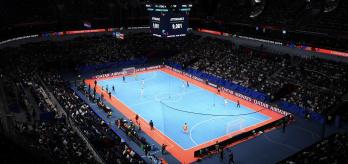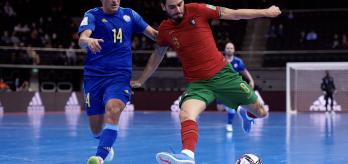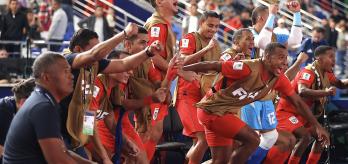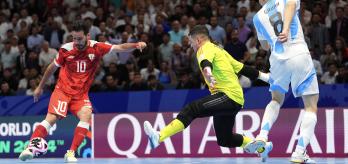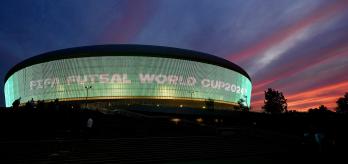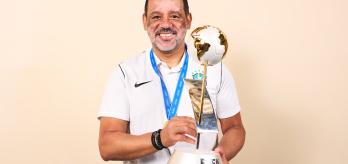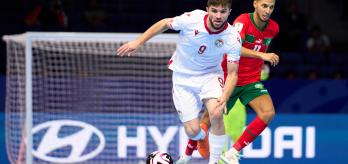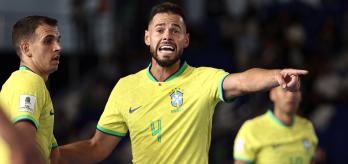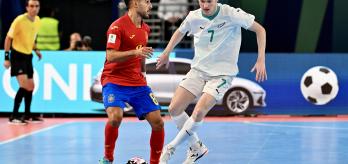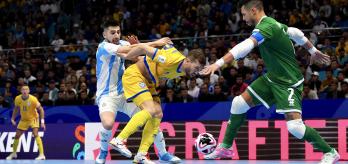FIFA’s Technical Study Group (TSG) are positioned in the three host cities of Tashkent, Bukhara and Andijan, ready to observe every game. Together with FIFA’s Performance Insights team, they will track any emerging technical or tactical trends. This tournament’s TSG consists of four members:
-
Pascal Zuberbühler, FIFA Senior Football Expert & TSG lead
-
Carlos Quiros, former Costa Rica head coach & information technology expert
-
Graeme Dell, FIFA Futsal Coaching Instructor & Development Consultant
-
Ali Targholizadeh, IRIFF Head of Technical & International
In the following article, the TSG respond to questions on the upcoming FIFA Futsal World Cup while also reflecting on some of the findings from the 2021 tournament. Together, they provide an insight into how the elite level of the sport has developed in the last three years leading up to Uzbekistan.
Evolution since FIFA Futsal World Cup 2021™
For the World Cup in 2021, FIFA launched its bespoke data-collection process for futsal. The 2024 tournament in Uzbekistan will be the second time FIFA uses this framework to steer its data collection. Why is this significant?
Graeme Dell: Collecting the data in 2021 was to follow up a new approach of looking at these World Cup Final tournaments. Previous technical study groups have relied upon the interpretation of the games by technical experts – that itself is nothing to be concerned about. However, we felt that when we looked at how some of the interpretations compared to the real data from tournaments, it didn't always correlate. Having the data available to us is really important because it can bring greater depth to our analysis, both challenging observations and supporting them. As technical experts, we can interpret that data as games unfold and examine why that data may present itself the way it does based on what we are seeing.
It’s important for 2024 to use the same data collection metrics as 2021 so we get consistency in data sets. We’ve tweaked one particular data area only very slightly because we felt it needed to be tweaked, so we went back and reassessed that data for 2021 to have comparable data in 2024. What we can’t do is keep changing the data set. We need to make sure that we’re on point in terms of determining what data we want to collect so that it will give us consistency when interpreting it.
In your analysis of 2021, you stated that the competition in Lithuania was the tournament for goalkeepers, due to their increased involvement in outfield play. Has this trend continued and are there now more well-rounded keepers that are capable of contributing meaningfully to their team's attack?
Pascal Zuberbühler: I'm not so sure that the role of the goalkeeper has principally changed. I think that what's happened is that the evidence base from 2021 has brought the involvement of the goalkeeper more to the forefront. So when we look at the number of restarts, the engagement of the goalkeeper in the counter-attack, the role of the goalkeeper in setting up the start of an attacking phase: it's more relevant than ever before because we now have the data to demonstrate that. The importance of the goalkeeper within futsal is an ongoing trend that has just become more evident to us as technical experts as we obtain the data.
If we think outside of futsal, to the broader football environment, there are times where a child gets stuck in goal because they're no good as an outfield player. We don't realise how important this period is – playing small-sided football – as a developmental stage for young players. So we need to be mindful about giving young players the experience to play in goal. We also need to help outfield players understand the role of the goalkeeper and their own roles in relation to the goalkeeper, for example making that passing opportunity for the goalkeeper significantly easier than perhaps it otherwise might have been. I think the answer within the question is that the goalkeeper is principally involved in every phase of attack that the team starts.
How has the global game in general developed since the last World Cup? What types of trends have you been witnessing in the last couple of years?
Ali Targholizadeh: Futsal is a fast-paced game. It requires a lot of preparation and a high level of fitness. I believe in this tournament we’ll see teams more prepared, and we’ll also see more competitiveness with more goals being scored. In the early stages of futsal’s development, it was played like 11-a-side football; teams would attempt to cross the ball, play in the air and use headers. But now, futsal is played with more high intensity, pressure and more across the ground. Players try and beat opponents 1v1, rotate positions and create space. There’s even power plays and flying goalkeepers which add an entirely unique dynamic to the game.
Remember, we had Lithuania 2021 one year after Covid-19, which was a disaster. For the futsal national teams that qualified for the World Cup, some of their confederations weren’t able to host qualifying competitions, meaning the qualifying teams were determined by the performance of the last championship they participated in. This is also worth considering.
In this tournament there are 24 participants from all over the world. Do geographical differences in style of play exist in futsal?
Carlos Quiros: My opinion is that there are two “models” or “schools” in world futsal. One comes from Spain and the other from Brazil. In the countries where a Spanish or Brazilian coach has worked is currently working, there is great tactical and technical influence. In Asia, for example, Brazilian, Argentinian and Spanish coaches have worked there, and in the same continent you see different styles of play. There are other models or schools of play as well: Iran, Morocco, Argentina and Portugal all have some Spanish or Brazilian influence but have developed their own improved versions. This has a lot to do with the fact that the best training schools in the world are European, South American and for several years we have also seen high-quality schools in Asia.
Several of the above questions were based on the report produced by the TSG present at the FIFA Futsal World Cup Lithuania 2021™. Click here to access their report.
Looking towards FIFA Futsal World Cup 2024 Uzbekistan™
We had a new winner in 2021, do you think we'll have another surprise in this upcoming tournament? Spain and Brazil were able to defend a World Cup title, what does it take to defend a World Cup title?
Zuberbühler: The one thing that Futsal has shown over the last three editions of the World Cup is that the chasing pack behind the top three or four nations are bridging the gap. In some regards, you could argue that this is maybe because top nations have not moved on, whereas the advancement has come from the second and third-tier teams and that has caused them to come closer. However, the game has moved on principally as a whole over the last three iterations of the World Cup anyway.
What does it take to defend a World Cup title? Well, it takes a lot because you have to be better than you were previously because the one thing you can guarantee is that those who fell short last time will be better than before. Another key component is being innovative – we know the current champions Portugal can be innovative. But the most impressive work the Portuguese have done has been to embed futsal across all of their development programmes for young players. In essence, this is investing meaningfully in the game of futsal within their country to make them better than their international opposition.
The tournament will be fascinating to watch. I think the competition will be too tight to predict but certainly Brazil, Spain, Portugal as well as Argentina, will be up there amongst the potential teams to take the title this time around. However, I do think it's perhaps more open than ever, considering that now we’ve had a number of teams that know how to win this competition.
There are four new participants in this tournament: Afghanistan, France, New Zealand and Tajikistan? What do you expect from them and is this a reflection of futsal gaining more traction globally?
Dell: What I’m expecting to see from the four new participants is that they’re all very different, bringing with them a bit of regional bias from Oceania, Asia and Europe. I would like to see that the gulf between the frequent World Cup and the four new qualifiers is not that significant. I’d like to think that the reasons the newcomers have qualified is because they’ve learnt from prior tournaments, their previous qualification stages and their peers that have been World Cup mainstays who understand how the game needs to be played in order to qualify.
Importantly, the new participants have hopefully looked into how to perform at the World Cup finals themselves. We did a lot of work in 2021 with the intention of guiding national teams in terms of what they need to do in order to succeed. We’d like to think, out of those four new nations, hopefully all, but certainly some of them will have taken on board the expert opinion and data sets that were collated to better inform coaches about how the game needs to be played.
Individually, we anticipate that they’ve equipped themselves well. We’d also like to think that they can be competitive – that’s the important thing – but above all else that they use this as a stepping stone. A first appearance is one thing, but returning again for a second, third or fourth successive appearance is the real test of the infrastructure and the progress they would have made over the last several years. It’s important that it’s not a one-hit opportunity, the aim needs to be to achieve successive qualifications.
What factors other than technique and tactics can influence a team’s performance and make the difference?
Quiros: There are other underlying factors. The development of excellent club-level tournaments and national-team events within each FIFA confederation gives players the opportunity to perform at a higher level, which in turn helps them develop. The international stars that come to the World Cup make the difference during match-defining moments as well. And, of course, the work of group cohesion, mental aspects such as concentration, unity, solidarity, respect and self-criticism are all also crucial. To finish, the work on physical preparation, strength and power, combined with all of the above, can all make the difference between teams that are very evenly matched.
You have a wealth of experience working for the AFC and IRIFF. Have you ever been to Uzbekistan before, and how big is this for the region?
Targholizadeh: Yes, I have been to Uzbekistan many times. We organised numerous Asian futsal championships in Tashkent, and recently I’ve witnessed futsal developing rapidly within the country. Their new stadiums and arenas are great. When you consider that 336 players are going to compete in this competition, this will have a big impact in our region. A knock-on effect from this tournament will be more countries in the region willing to host FIFA and Asian championships.
The full FIFA Technical Team for Futsal World Cup 2024
Project Leads
Arsène Wenger – Chief of Global Football Development
Steven Martens – Director of Global Football Development
Tom Gardner – Lead of Football Performance Insights
Technical Experts
Pascal Zuberbühler – Senior Football Expert & TSG lead
Carlos Quiros – Technical Expert
Graeme Dell – Technical Expert
Ali Targholizadeh – Technical Expert
Football Performance Insights
Harry Lowe – Team Lead Football Performance Analysis
Alessandro Foglino – Football Performance Analyst
Jeremy Chor – Football Performance Analyst
Natascia Prieto – Football Operations Manager






